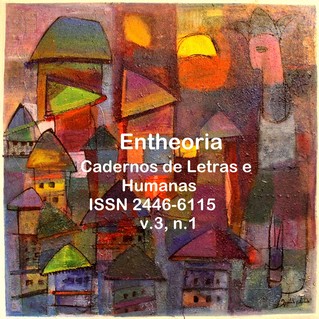ON THE FEMININE FICTION OF THE BLACK DIASPORA: A WRITING DANGLING BETWEEN ORDER AND CHAOS
Keywords:
Nietzsche, Filosofia, Memória autobiográfica, Mulher negra, Apolo e DionísioAbstract
This work aims at showing, through the study of four pieces from both Brazilian and American literatures of autobiographical memory, the applicability of the theory developed by Friedrich Nietzsche on human behavior (here restrict to black women) facing their reactions to racial prejudice and discrimination on the part of the dominant society. As a product of urban realism, the black fiction of the diaspora suggests disappointing experiences to afrodescendants in the mainstream of society. However, when it comes to the literature written by women, one perceives almost invariably a tendency to tragedy, whose essence is irreparable, not only under the viewpoint of the protagonist, but also, of the objective reality, which adds to it an additional prejudice, the one of gender. These tragic views make the heroines´ perceptions turn out to be destructive of the unity inside the moral world and menace to extinguish the balance between the gods Apollo’s and Dionysus impulses, united by tragedy. Searching for support in the Nietzschian theory, we take as parameters the images of Apollo and Dionysus who, in accordance to the philosopher, respectively stand for culture and counterculture. This theoretical frame serves to develop the argument that such as Apollo and Dionysus, women in a general way, and particularly black Women, by the triple subalternity of gender, race, and class, tend to be effectively related to one or another god, depending on the way they react to their social condition. To do so, we analyze a corpus constituted by the autobiographical novel Diário de Bitita (1986), by the afro-Brazilian Carolina Maria de Jesus; the equally autobiographical short story “To Da Duh, in memoriam” (1967), by the Afro-Barbadian Paule Marshall, the novel The Bluest Eye (1970), by the Afro-American Toni Morrison and “Duzu Querença” (1993), a short-story by the afro-Brazilian Conceição Evaristo, objectifying to demonstrate how the Works of such women writers of the diaspora fit Nietzsche’s philosophy in what concerns the way its female characters react when confronted to racism, sexism, and oppression imposed to black women, wherever such harassment comes to happen.Downloads
References
EVARISTO, C. Duzu Querença. In: Cadernos Negros, 16. São Paulo: Edição dos autores, 1993.
FANON, F. Pele Negra, Máscaras Brancas. Trad. Renato da Silveira. Salvador: EDUFBA, 2008.
FONTENOTE, Jr. C. J. Black Fiction: Apollo or Dionysus?. In: Mc BRIEN, W. Twentieth Century Literature: A Scholarly and Critical Journal. VoI. 25, n.1. New York: Hofstra UP, Spring, 1979 (p.73-84).
GATES, Jr. H. L.; McKAY, N. (Eds). The Norton Anthology of African American Literature. New York: W.W. Norton & Co., 1997.
JESUS, C. M. Diário de Bitita. Rio de Janeiro: Nova Fronteira, 1986.
MORRISON, T. The Bluest Eye. New York: Plume, 1994.
NIETZSCHE, F. O Nascimento da Tragédia. Ed. de Bolso. São Paulo: Companhia das Letras, 2004.
Downloads
Published
How to Cite
Issue
Section
License
O(s) Autor (es), na qualidade de titular (es) do direito de autor do ensaio ou artigo submetido à publicação, de acordo com a Lei nº. 9610/98, concorda (m) em ceder os direitos de publicação à Revista Entheoria e autoriza(m) que seja divulgado gratuitamente, sem ressarcimento dos direitos autorais, por meio do Portal de Revistas Eletrônicas da UFRPE e sites associados, para fins de leitura, impressão e/ou download pela Internet, a partir da data da aceitação do artigo pelo Conselho Editorial da Revista. É vedada a submissão integral ou parcial do manuscrito a qualquer outro periódico.


























